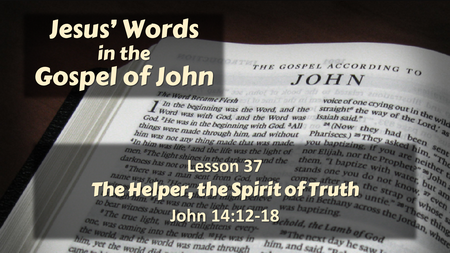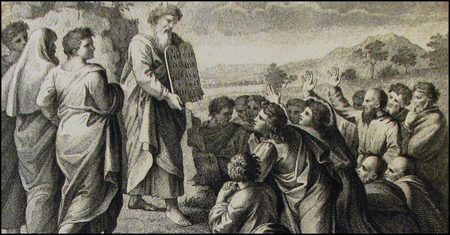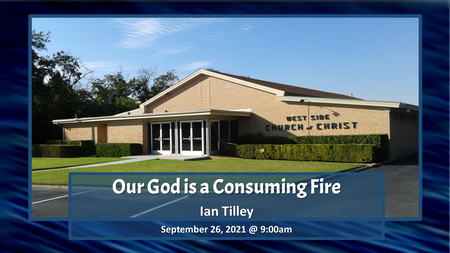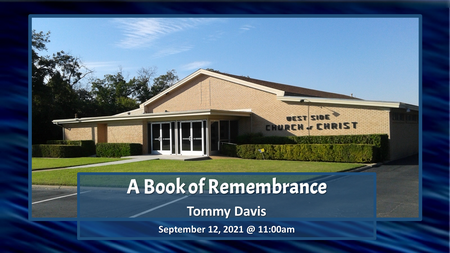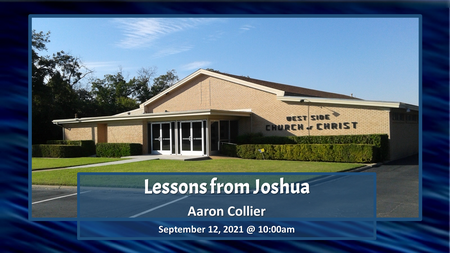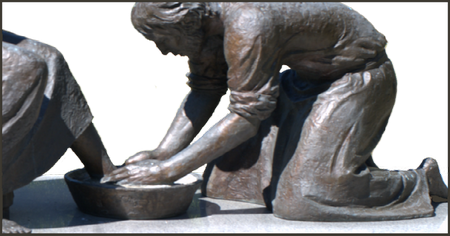Category: Obedience
Subject: Obedience
Sermon: The Helper, the Spirit of Truth
A discussion of Jesus’ conversation with His disciples, recorded in John 14:12-18.
The Patternists: Hold the Traditions
The apostle Paul used an interesting turn of phrase in exhorting his readers, in 2 Thessalonians 2:15, “Therefore, brethren, stand fast and hold the traditions which you were taught, whether by word or our epistle.”
His exhortation is to be a response to the calling of God. The elect of God are eligible to obtain “the glory of our Lord Jesus Christ” (14). Because of what God has done for us as Christians, and the hope we enjoy, we have a responsibility to “stand fast.”
The Patternists: Conduct Yourselves in Fear
The apostle Peter, in his first epistle, emphasized the importance of living holy lives. “Therefore gird up the loins of your mind, be sober, and rest your hope fully upon the grace that is to be brought to you at the revelation of Jesus Christ; as obedient children, not conforming yourselves to the former lusts, as in your ignorance; but as He who called you is holy, you also be holy in all your conduct, because it is written, “Be holy, for I am holy” (1 Peter 1:13-16).
The text continues with a discourse on the redemption of his readers. They were redeemed with “the precious blood of Christ” (19). Christ was raised from the dead, “so that your faith and hope are in God” (21).
Continue reading “The Patternists: Conduct Yourselves in Fear” →
Glorifying God’s Word
There is an interesting phrase from the pen of the apostle Paul, “Finally, brethren, pray for us, that the word of the Lord may run swiftly and be glorified, just as it is with you” (2 Thessalonians 3:1). The phrase is, “that the word of the Lord may…be glorified.” Paul was asking that these faithful brethren petition God on his behalf. It was his desire that through his efforts, the word of the Lord would spread swiftly. That is, that many would hear and repeat it. Also, that it would be glorified. By this Paul meant, as noted by Thayer, that through his efforts the value of the word of God would become evident or made manifest.
A similar statement is made by the Lord regarding our influence. “Let your light so shine before men, that they may see your good works and glorify your Father in heaven” (Matthew 5:16). We extol the greatness and righteousness of God whenever we live in accord with His will. Men see it, and “glorify” Him.
The Patternists: “All that the Lord has spoken”
Exodus 19 chronicles the arrival of the Israelites at Mount Sinai, where Moses was to receive God’s commandments on the mount. The Lord instructed Moses to tell the people, “Now therefore, if you will indeed obey My voice and keep My covenant, then you shall be a special treasure to Me above all people; for all the earth is Mine. And you shall be to Me a kingdom of priests and a holy nation…” (Exodus 19:5-6).
Moses relayed God’s message to the people, and they responded in a commendable fashion. “Then all the people answered together and said, ‘All that the Lord has spoken we will do…’” (Exodus 19:8). We know, of course, that they reneged on that promise many, many times through the course of their history as a nation. But, the words remain a basis of the covenant God held with them. He promised a special place for them, above all people, conditioned upon their obedience. They promised that obedience to “all that the Lord has spoken.”
Continue reading “The Patternists: “All that the Lord has spoken”” →
A Stone’s Throw
A few weeks ago my son Jeremiah preached a lesson titled, “The Distance Greater Than a Stone’s Throw.” The principles found in that lesson are worthy of examination, and I would like to adapt his teaching in this article.
The reference is to Jesus’ prayer in the garden of Gethsemane on the night of his betrayal, (Luke 22 & Matthew 26). Matthew reveals that after entering the garden, Jesus, Peter, James and John walked a bit further into the garden. There, Jesus left the three of them, and “He was withdrawn from them about a stone’s throw” (Luke 22:41), where He began to pray to His Father. He was in agony. After finding them asleep, Jesus said to Peter, “What! Could you not watch with Me one hour? Watch and pray, lest you enter into temptation. The spirit indeed is willing, but the flesh is weak” (Matthew 26: 40-41).
Sermon: Vain Things
The writer of Ecclesiastes recognized something we must learn as well. There is no intrinsic value in wisdom, pleasure or possessions. If we do not serve God, our life is lived among vain things.
The Patternists: Turning Your Heart from God
King Solomon serves as a cautionary tale to all Christians concerning the necessity of staying true to God’s will. Most are aware that Solomon began his reign as King of Israel in a commendable way, as a young man asking God for wisdom, that he might be a capable king. We are told, “And God gave Solomon wisdom and exceedingly great understanding, and largeness of heart like the sand on the seashore”; and “he was wiser than all men” (1 Kings 4:29,31).
Solomon built a temple to the Lord and placed the ark of the Lord in it. At the dedication of the temple, Solomon prayed, saying “Lord God of Israel, there is no God in heaven above or on earth below like You” (1 Kings 8:23).
Continue reading “The Patternists: Turning Your Heart from God” →
The Word of a King
(Ecclesiastes 8:2-4), “I say, ‘Keep the king’s commandment for the sake of your oath to God. Do not be hasty to go from his presence. Do not take your stand for an evil thing, for he does whatever pleases him.’ Where the word of a king is, there is power; And who may say to him, ‘What are you doing?’”
The wise man’s words ring true in our time. As pandemic mandates gain traction, and our society polarizes more and more each day, many feel that our government is guilty of overreach. Whatever your view of this particular matter, there are a few points that are beyond dispute.
FIRST, our responsibility to be obedient to the governing authorities is one that has God as it’s source. It is a part of our agreement as Christians. Paul agreed with the wise man on this matter (cf. Romans 13:2). Of course, there are limits (cf. Acts 5:29).
SECOND, doing what is unlawful (“an evil thing”) will bring consequences from the authorities — “for he does whatever pleases him.” It is always a losing hand to rail against “the man.”
THIRD, “Where the word of a king is, there is power.” We may not like it when the authorities abuse their authority. We may cry out and complain — but no amount of threatening on our part will keep them from doing what they want to do.
It is for this reason we long for eternity. We realize that in the end, this world is a mere layover to eternity. In the end all inequities will be resolved. All abuses will come to an end. All suffering will cease. Praise be to God! “But even if you should suffer for righteousness’ sake, you are blessed. ‘And do not be afraid of their threats, nor be troubled’” (1 Peter 3:14).
Click below to…
Sermon: Our God is a Consuming FIre
Speaker: Ian Tilley
A short (12 min.) discussion of the text of Hebrews 12:25-29, with applications.
Sermon: A Book of Remembrance
Speaker: Tommy Davis
In Malachi 3, the prophet reminded the people of their disobedience, and their responsibilities before God.
Sermon: Lessons from Joshua
Speaker: Aaron Collier.
A discussion of the book of Joshua in a class setting.
The Patternists: Are You Honest? Or a Liar?
Let me ask you a question. “Do you know God?”
“You do? Wonderful! But, can I trust your answer? Do you really know God? You aren’t lying, are you? Can you prove that you really know God?
The above conversation would anger some, unsettle others. I understand that many would take offense at being asked such a question, and then having their affirmative response questioned or challenged. But, consider the following words from the pen of John the apostle.
“Now by this we know that we know Him, if we keep His commandments. He who says, “I know Him,” and does not keep His commandments, is a liar, and the truth is not in him. But whoever keeps His word, truly the love of God is perfected in him. By this we know that we are in Him. He who says he abides in Him ought himself also to walk just as He walked” (1 John 2:3-6).
Continue reading “The Patternists: Are You Honest? Or a Liar?” →
The Patternists: Building on the Sand
My grandson (2 years old) loves to have his Granna sing the wise man/foolish man song to him. Lately, each time he visits he goes directly to the giant LEGO blocks we have for the grandkids to play with, to get Granna to build a “house” for him to demolish when she gets to the words, “And the foolish man’s house went, SPLAT!” (Giggle, giggle, then do it all again).
Jesus’ words in Matthew 7:24-27, paraphrased in the song, teach significant truths that both children and adults need to learn. Consider what Jesus said:
“Therefore whoever hears these sayings of Mine, and does them, I will liken him to a wise man who built his house on the rock: 25 and the rain descended, the floods came, and the winds blew and beat on that house; and it did not fall, for it was founded on the rock. 26 But everyone who hears these sayings of Mine, and does not do them, will be like a foolish man who built his house on the sand: 27 and the rain descended, the floods came, and the winds blew and beat on that house; and it fell. And great was its fall.”
That They May Distinguish My Service
Shortly after Rehoboam became king of Judah, the scripture reveals that he “forsook the law of the Lord, and all Israel along with him” (2 Chronicles 12:1). The specific sins of the nation are stated in 1 Kings, as they “built for themselves high places, sacred pillars, and wooden images on every high hill and under every green tree. And there were also perverted persons in the land. They did according to all the abominations of the nations which the Lord had cast out before the children of Israel” (1 Kings 14:23-24). God chose to chastise the king and the nation by raising up the king of Egypt against them. Shishak, the Egyptian ruler, invaded Judah with 1,200 chariots, 60,000 horsemen, and a large number of his people.




